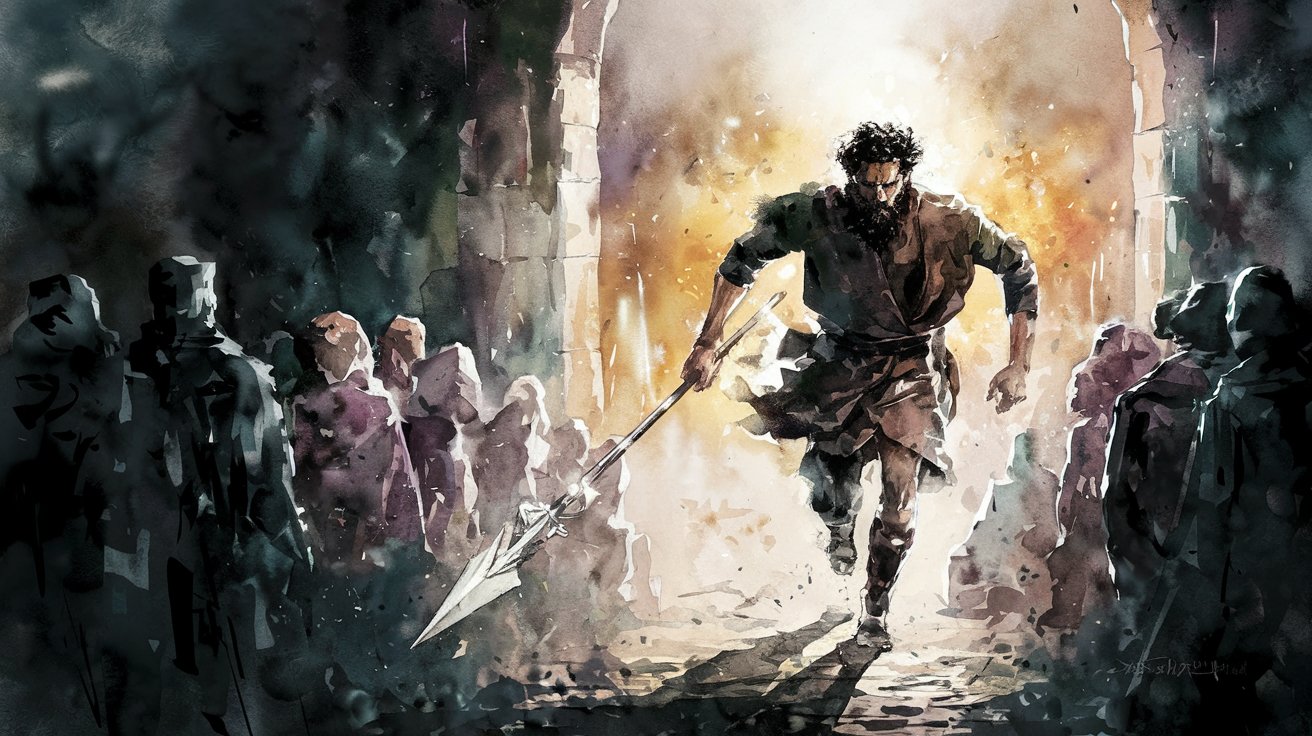In the Book of Numbers, Chapter 25, we encounter a moment that stands as a powerful example of courage and decisive action in the face of overwhelming sin. This moment, involving Phinehas, the grandson of Aaron, reveals the importance of standing firm for what is right—even when it feels like you’re alone, or when the cultural tide is against you. Phinehas, acting swiftly and decisively, did what needed to be done, even if it seemed extreme or controversial to those who didn’t understand the gravity of the situation. His actions saved the lives of thousands and changed the course of Israel’s history.
The Context: A Nation on the Brink
At this point in the story, Israel was in a dire situation. The people had repeatedly turned away from God, choosing to defy Him and fall into idolatry and immorality. They had been seduced by the Moabite and Midianite women, and it wasn’t just about illicit relationships. These men of Israel were not merely making unwise choices in their personal lives; they were engaging in acts of worship to false gods, bowing down before idols, and abandoning the one true God. This was spiritual adultery on a massive scale, one that was poisoning the soul of Israel.
Despite the warning signs, the people continued down this dangerous path, even as a deadly plague swept through the camp, killing 24,000 people. The plague was a direct consequence of Israel’s sin. It was the result of turning away from God and embracing a culture that stood in direct opposition to His holiness.
Phinehas: A Bold Stand
Amidst this chaos, a man named Zimri, an Israelite from the tribe of Simeon, openly defied God. He took a Midianite woman, Cozbi, into his tent, not only engaging in an immoral relationship with her but also bringing her into the camp of Israel—effectively bringing her pagan worship into the heart of God’s people. This act was a direct attack on everything that God had commanded His people to avoid. Zimri’s blatant sin wasn’t just personal; it was a public act that would lead others to follow his example, furthering the spiritual destruction of the nation.
Phinehas, observing this sin, acted decisively. He didn’t wait for someone else to address the issue. He didn’t wait for a committee or for the moral culture to catch up. He didn’t say, “I’m sure someone else will deal with this.” Instead, he picked up a spear and, in a swift and courageous act, killed both Zimri and Cozbi, ending their defiance of God and halting the spread of sin.
At first glance, Phinehas’s actions may seem extreme, even violent, and some critics of the Bible may point to this moment as an example of God’s “jealous” wrath. But in order to understand the significance of Phinehas’s actions, we need to look at the situation as a whole.
The Gravity of the Situation
Phinehas wasn’t reacting to a small infraction; he was responding to a systemic, culture-wide rebellion against God. This wasn’t just about a single immoral act. The people of Israel had been “whoring” with the Moabites and Midianites, which wasn’t about cultural exchange or even marriage. These men were willingly participating in sinful acts of idolatry, bowing down to false gods, and defiling themselves in a way that was directly contrary to God’s law.
It wasn’t just about Zimri bringing a woman from another tribe into the camp. It was about the spiritual rot that had spread through Israel. In fact, the sin was so widespread that it had reached the very threshold of the tabernacle, the house of the Lord. Phinehas recognized that if this sin was allowed to continue unchecked, it would lead to even greater destruction. His act was one of spiritual warfare—an act of courage that sought to restore holiness to a people who had grown complacent in their disobedience.
Phinehas’s decision to act may seem shocking to modern sensibilities, but his swift and decisive action was not an outburst of personal anger; it was a faithful response to the gravity of Israel’s sin. He saw the bigger picture—he saw that this sin, if left unaddressed, would bring about even more death and destruction. He knew that sometimes, in order to stop the rot, drastic measures are required. And in this case, Phinehas did what was necessary to save his people.
Courage to Stand Alone
Phinehas’s actions weren’t just about being right; they were about having the courage to do what was necessary, even if it meant standing alone. This was a moment when the right thing to do wasn’t the popular thing. It was a moment when Phinehas had to make a bold stand, even though it was clear that he might be alone in doing so.
Imagine the weight of what Phinehas was doing. He wasn’t just confronting a single individual; he was confronting a widespread problem within the nation of Israel. He knew that by taking this action, he would be challenging not just the individual sinner but also the cultural norms of his people. And yet, Phinehas did what was right, despite the odds.
This is where we can find powerful lessons for today. In our own lives, we are often faced with situations where standing up for what is right may not be easy, and it may even lead to us standing alone. In a culture that often turns its back on God, we may feel isolated or discouraged when we see the moral decline around us. But Phinehas’s example teaches us that even in such moments, it is possible to act courageously and decisively. You can stand up for what’s right, even when you feel like you’re the only one who sees it.
The Reward of Obedience
Phinehas’s actions didn’t go unnoticed. In fact, after he acted, God spoke to Moses and praised Phinehas for his zeal, for his “jealousy” for God’s honor. God even promised Phinehas that his family would be granted a perpetual priesthood as a reward for his faithful actions (Numbers 25:10-13). This is a powerful reminder that when we choose to act in obedience, even when it is difficult or unpopular, God honors our faithfulness.
Phinehas’s reward was not just a promise for himself but for his descendants, showing us that God blesses those who take a stand for His holiness. In the same way, when we stand firm in the truth of God’s Word, we can trust that our obedience will lead to blessings, not only for us but also for those who follow us.
Courage in Our Own Time
While Phinehas’s actions were extreme by today’s standards, we must remember that he was fighting a battle that was far bigger than the one before him. He was standing for the holiness of God in a time of spiritual decay. And while we are not called to pick up a spear in today’s world, we are called to be warriors in the spiritual battle that surrounds us. Our weapon is the Word of God, and it is more than sufficient to face the challenges we encounter.
In a world that often turns its back on God, it may be intimidating to speak the truth or stand up for what’s right. But we can take courage from Phinehas’s example. When you are standing for God’s truth, you are never truly alone. God stands with you, just as He stood with Phinehas. Your obedience will honor Him, and that is far more precious than the approval of the world.
So, let us be bold and courageous. Let us be willing to stand for what is right, even when it feels like no one else will. We don’t have to fight physical battles, but we are called to stand firm in our faith and declare the truth of God’s Word. Trust in the Lord, carry His Word confidently, and remember that it is through obedience to God’s will that true peace and restoration come.




